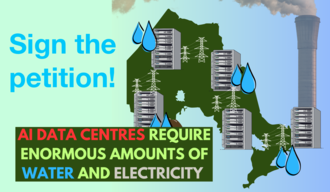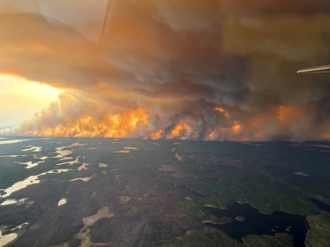-
Save Ontario's Conservation AuthoritiesShrinking 36 Ontario Conservation Authorities (CAs) to 7 monster CAs will threaten our drinking water and our homes from flooding. We will lose our local expertise, and hands-on monitoring to protect our widely varied watersheds, our drinking water, and our flood protections. 85 % of Ontarians depend on our CAs to protect their drinking water. Our CAs maintain and monitor over 900 dams, dykes, channels & erosion structures & care for the wetlands that filter our water and cool summer's heat. Ontario's Conservation Authorities are funded about 53% by surrounding municipalities, local citizens funding 35% (with small fees and fundraising.) The province only contributes 5 - 8% to fund them: a unique watershed-based system. This amalgamation means our cities & townships will lose the governance of their own money, despite funding the CAs. For example, in the proposed new "St. Lawrence CA" which will merge 5 large CAs into one, there are 70 municipalities with elected council members on those CA Boards. The Ontario Environment Minister states they will appoint a central committee to oversee all CAs. The province states they want to amalgamate all the CAs to streamline the permitting system for developers. Instead, the province could create a computer program to deal with permits province-wide, send it to the CAs with new computers, & train people there to use it. (Then, we have to cross our fingers and hope the province does not start selling off our publicly owned Conservation Areas to developers, as they are doing to Wasaga Beach Provincial Park.)440 of 500 SignaturesCreated by J Jerreat
-
Support a Strong Climate Action Plan for TorontoThe City of Toronto adopted a climate action plan called TransformTO in 2017, in 2021 the city accelerated its TransformTO targets in line with the climate emergency that was declared in 2019. The first 5 year plan approved in 2021 is in its last year and City Council will have a new climate plan coming to its December meeting (Dec 16). City Council needs to know that thousands of Torontonians support an ambitious climate action plan. Residents of Toronto have already begun to feel the impacts of the climate emergency that the City declared in 2019. Major flooding events, an increasing number of heat days, and air quality decreasing to unhealthy levels from pollution and forest fires have already affected our cost of living, our health and overall day to day movements. In order to meet the challenges caused by a warming planet Toronto must continue and accelerate its commitment to NetZero by 2040. We encourage all councillors to adopt a bold, equitable and strategic plan for mitigating and adapting to this crisis and support TransformTO 2026-2030. We will present our petition of support to City Council on December 16. Help build a healthy, low-carbon, climate-resilient city where we can all thrive. Please sign and share this petition.350 of 400 SignaturesCreated by Lyn Adamson
-
Banks: Your $60 Billion Profit Is Fueling a Housing and Climate Crisis You Can Help EndThe Truth About Your Role: Your mortgage lending drives up house prices, making homeownership unaffordable. You finance landlords who evict long-term tenants to maximize rents, while your commercial lending criteria reward displacement over affordability. You've erected barriers that block non-profit housing providers from building the homes we desperately need; requiring 35% equity and loan guarantees that corporate landlords never face. And while you've abandoned climate commitments by leaving the Net Zero Banking Alliance, you continue financing sprawl and energy-inefficient buildings without assessing their carbon footprint; locking in decades of emissions while calling real estate "green investment." What We Demand: 1. Reform your commercial lending practices and risk assessments. Stop incentivizing corporate landlords who raise rents, evict tenants, and reposition buildings from affordable to luxury. Deny financing to those who use evictions as a common business practice, or where patterns of tenant displacement are evident or likely to occur especially as a means of debt financing. 2. Publicly disclose to your customers if their mortgages are packaged and sold to investors. 3. Level the playing field for non-profit housing providers so that they can secure loans to purchase, retrofit or build truly affordable housing. 4. Invest in solutions by directing 15% of annual profits above $1 billion toward financing affordable housing construction, acquisition, and deep retrofits that maintain affordability in perpetuity. 5. Honor your climate commitments by assessing and publicly disclosing the climate impact of all residential real estate lending. Stop financing projects that increase emissions and prioritize conversions and adaptive reuse projects that are energy-efficient, and connected to public transit. Canada doesn't just need more housing, we need a banking system that builds communities instead of destroying them. Read more about the role that Banks have to play in Canada’s housing crisis here. Sign if you believe banks should be part of the solution, not the crisis.35 of 100 SignaturesCreated by Kirsten McRae
-
Young Canadians are suing to protect the CPP. Join them in demanding action on climate risk.The Canada Pension Plan (CPP) is supposed to protect our future. But instead, the people managing our national retirement fund are gambling billions on oil, gas, coal and pipelines – putting the financial futures of 22 million Canadians at risk. Now, four young Canadians are taking the managers of the CPP fund to court. This landmark case argues that CPP investment managers are failing to manage the financial risks of climate change while investing billions in fossil fuels – and in doing so, violating CPP’s legal duty to act in the best interests of contributors and future retirees. This isn’t just reckless. It may be unlawful. And it's putting our pensions and our planet in danger. Tell the CPP fund managers: stop fuelling the climate crisis with our pensions. Recommit to net-zero, phase out fossil fuels, and protect our financial future. Learn more about the legal case here.1,163 of 2,000 SignaturesCreated by Cheryl Randall
-
Say NO to AI Data Centres in Ontario!There are major ramifications that Premier Ford and Energy Minister Stephen Lecce should know with respect to AI data centres: 1. The major beneficiary of building new AI data centers in Ontario are American companies. Most notably, a single American company: NVIDIA. AI data centers are, essentially, warehouses for Graphics Processing Units, or GPUs. The GPU market is widely understood as a de facto monopoly, with NVIDIA controlling more than 90% of the sales of GPUs (Yahoo Finance, 2025). NVIDIA -- an American company with close ties to the Trump administration (Rapoza, 2025) -- benefits first and foremost from the sale. That is, the primary beneficiary of such a deal is an American company, not an Ontarian or even a Canadian one. 2. Rising electricity and water bills for residents and businesses: Paying higher water and electricity bills will make life more unaffordable for millions of residents and businesses across Ontario. In the U.S., new data centres have already notably increased electricity bills in many cities and small towns. 3. AI data centers contribute to massive increases in GHG emissions, particularly from fossil fuels. 4. AI data centres require massive amounts of water and electricity (particularly from fossil fuels and nuclear), negatively impacting the environment. For instance, “across the globe, Microsoft’s 300 data centres consume more than 125 million litres of water per facility each year. That’s the equivalent of 15,000 Olympic size swimming pools filled with water at each data centre.” Moreover, “by 2030–2035, data centers could account for 20% of global electricity use, putting an immense strain on power grids.” It is crucial to respect nature. There is no economy without clean air, clean water, and a healthy ecosystem. Humans cannot survive without a healthy environment. In other words, we cannot prioritize short-term economic growth over the environment. As stated by Golestan (Sally) Radwan, the Chief Digital Officer of the United Nations Environment Programme (UNEP), “Governments are racing to develop national AI strategies but rarely do they take the environment and sustainability into account. The lack of environmental guardrails is no less dangerous than the lack of other AI-related safeguards.” 5. Local, marginalized communities face disproportionate costs and health impacts: In South Memphis, an overwhelmingly Black neighbourhood has seen a sharp rise in asthma attacks and other respiratory problems since xAI’s data centre began operating there in June 2024. xAI is now facing legal action by the NAACP over air pollution. 6. Excessive E-waste and mineral extraction: Data centres produce large amounts of electronic waste, which often contains hazardous substances like mercury and lead. To explain, “the short lifespan of GPUs and other HPC components results in a growing problem of electronic waste, as obsolete or damaged hardware is frequently discarded. Manufacturing these components requires the extraction of rare earth minerals, a process that depletes natural resources and contributes to environmental degradation.” 7. Lack of transparency: There is a lack of transparency and accountability of AI data centres. To tackle this, there needs to be more opportunities for public engagement and real consultation with climate groups, human rights organizations, and local communities. Throughout the whole process, Indigenous communities must be a partner in the decision-making process and treaty rights must be respected at all times. 8. Uncertainty in the business model of AI data centres: Many data centres have yet to prove that they have a viable business model. Currently, most generative AI services are available for free and it is uncertain whether AI-users would be willing to pay for these services if there was a charge. “The scale of the investment is sparking concerns about a bubble and the potential for a pop that could bring the stock market crashing down from record heights…The money spent this year on AI infrastructure and software has contributed more to GDP growth than consumer spending, according to Renaissance Macro Research's reading of Bureau of Economic Analysis data.” 9. Minimal economic gains for the local community and few new jobs: AI data centres can be expected to create only a handful employment opportunities (sometimes just 10-100 jobs per facility), spurring minimal long-term economic gains to local residents. Many operations jobs for running AI data centres can be done remotely as well, employing workers that are not local, even overseas. We are opposed to economic growth that is not distributed equally and make wealthy tech investors and business owners even wealthier.214 of 300 SignaturesCreated by ClimateFast Action
-
Protect Agritourism in BC: Align TNRD Policies with ALR/ALC RegulationsAcross British Columbia, farmers are facing unnecessary barriers because local governments are misclassifying agritourism accommodations. The Agricultural Land Reserve (ALR) and Agricultural Land Commission (ALC) clearly recognize agritourism as a permitted farm use. Yet, in the Thompson‑Nicola Regional District (TNRD), seasonal, off‑grid farm‑stay units are being misclassified as “single family dwellings.” This misclassification threatens the viability of agritourism businesses, undermines provincial policy, and penalizes farms that are operating in good faith under ALR/ALC guidelines. Agritourism is not just about farm stays — it’s about: • Strengthening rural economies. • Supporting local food systems. • Providing authentic educational and cultural experiences. • Building bridges between farms and communities. When local governments undermine agritourism, they undermine the resilience of farming itself. Join Us We urge the TNRD Board to reject punitive measures and instead work with farmers, chambers, and tourism groups to create policies that support agritourism across the region. 👉 Sign this petition to stand with BC farmers and protect the future of agritourism.17 of 100 SignaturesCreated by Kaare Long
-
Shut down the Metro Vancouver IncineratorThe Burnaby incinerator, located in an urban environment and near neighbourhoods and farms, is a major source of pollution. Touted as waste to energy, it wastes more energy than it recovers. Burning solid waste, 20% of the material going in comes out as toxic ash and the remaining 80% is released into the air. Emissions include dioxins, furans, heavy metals like arsenic, mercury and lead as well as nitrogen oxides, sulfur dioxides, and many more types that can cause cancer, breathing problems and disrupt endocrine systems. These are harmful to human and environmental health and some can accumulate on agricultural land. It is one of the top 25 greenhouse gas emitters in the province. Very expensive to run, it prevents far better solutions like zero waste actions of reducing, reusing, repairing, sharing, composting and recycling from being implemented. As Metro Vancouver is developing its new solid waste management plan that they will then ask the Ministry to approve, NOW is the time to push back and ask for the incinerator to be shut down.323 of 400 SignaturesCreated by Sue Maxwell
-
No Northern Gateway oil pipeline and No large oil tankers in BC's Great Bear Sea!The Northern Gateway pipeline project will pose significant environmental risks, particularly regarding potential oil spills and increased greenhouse gas emissions. The pipeline would have crossed numerous rivers and streams, potentially harming salmon habitats and other aquatic ecosystems. The increased tanker traffic to transport the oil would have also raised the risk of marine spills and disturbances to coastal environments, including the Great Bear Rainforest. We want to protect all the watersheds, rivers, streams and wildlife habitats along the proposed pipeline route and salmon, oysters, shrimp, sable fish, etc. in BC's coastal waters. We want future generations to marvel at Orcas, Grey and Humpback whales, Sea Lions, Sea Otters, Sea Bird. We want clean beaches and a pristine Great Bear Rainforest & Sea and Haida Gwaii.1,878 of 2,000 SignaturesCreated by Bradley Foster
-
Canadians can’t afford the climate crisis, literallyThe climate crisis is expensive. In just a few hours during July 2024, heavy rainfall in Toronto caused over $940 million in insured damages. A month later in August, a 20-minute hailstorm in the Calgary area led to $3.25 billion in insured losses with 130,000 claims filed in a single day. When we go beyond just looking at the insured losses and account for the cost of these extreme weather events on healthcare, businesses, and social factors, the costs are even greater. For example, Swiss Re estimates that the financial impact of the Fort McMurray wildfires cost around $8.9 billion or 5.2 times greater than insured losses of $1.7 billion. What is the largest contributor to this problem? Fossil fuels. Fossil fuels – coal, oil, and gas – are by far the largest contributor to climate change, accounting for over 75% of global green house gas emissions and nearly 90% of all carbon dioxide emissions. As greenhouse gas emissions blanket the Earth, they trap the sun’s heat. This leads to global warming and climate change. Heat-pumps and Green Building Standards are an important part of the energy transition. Local governments who are closest to the ground must be treated as equal partners in this as they are the ones closest to the ground, understand the needs of the community, and engage in deliberative processes.6 of 100 SignaturesCreated by ClimateFast Action
-
Stop the Meaford Pumped Storage ProjectThis shamelessly greenwashed environmental and fiscal misadventure is an absolutely needless waste of taxpayer dollars when a far less costly and environmentally sustainable means of providing a more efficient and upgradable electrical storage facility can be done faster with a battery park on Saugeen/Ojibway land beside the Bruce Nuclear Power Plant in Tiverton Ontario. Having to run a new high voltage transmission corridor from Bruce Nuclear Power plant to run pumps in Meaford is a flagrant abuse of funds and the environment when a battery park near the power source can be built and service our struggling electrical grid far sooner and for a fraction of the cost.5 of 100 SignaturesCreated by patrick ellard
-
No Golden Dome for CanadaThe Golden Dome purports to defend North America against incoming missiles by placing interceptors in space, but the technical challenges are enormous, the costs astronomical, and the strategic risks profound. This project has the potential to spark an arms race and potentially make a pre-emptive attack more likely. According to former Foreign Affairs Minister Lloyd Axworthy, "The proper response to another Trump-era folly is not quiet consideration or cautious diplomacy. It’s a firm, unequivocal no – just as it was in 1985." Canadian values should incline us to put additional federal dollars into global conflict resolution and emergency foreign aid rather than expend mega-billions on a potentially costly boondoggle with an unreliable partner that will make the world even more unstable and insecure. We know that true security comes from investing in housing, healthcare, education, and climate justice—not billion-dollar weapons in space. The Golden Dome is a betrayal of those priorities. Join me in demanding better — sign the petition to Prime Minister Mark Carney and say no to this reckless scheme.10,056 of 15,000 SignaturesCreated by Larry Kazdan
-
Don’t let the Canada Pension Plan abandon its net-zero commitmentThe Canada Pension Plan safeguards the futures of 22 million hardworking Canadians – from teachers and nurses to tradespeople and tech workers – and retirees who’ve paid in over a lifetime. With over $714 billion of our retirement savings, it’s one of the largest investment funds in the world – and it has the power to help drive the global transition away from fossil fuels. In 2022, our national pension manager committed to reaching net-zero emissions by 2050. But in May 2025, the Canada Pension Plan Investment Board (CPPIB) quietly abandoned that promise, putting our retirement security and climate future at risk. This is worse than a broken promise. It’s a failure of responsibility. CPPIB is legally bound to protect long-term returns without taking on undue risk. But a future shaped by 3.1°C of global warming – the path the world is currently on – threatens not just portfolio performance, but the very survival of the Canada Pension Plan itself. Working Canadians under 40 won't retire until well after 2050. They are counting on a pension fund that can withstand a future shaped by climate change – not one that fuels it. Send a message to CPPIB now. Demand they re-commit to a net-zero future and protect the financial future of every Canadian who pays into the Canada Pension Plan. For more information see our statement here.5,375 of 6,000 SignaturesCreated by Cheryl Randall






.png)



.png)